2011英语阅读
2011年考研英语一阅读
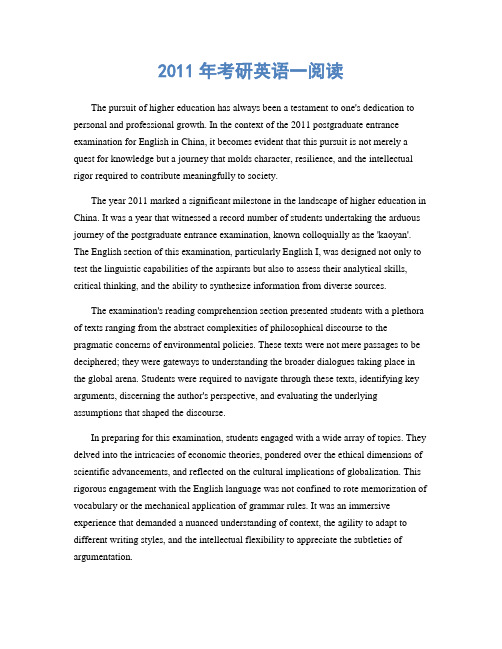
2011年考研英语一阅读The pursuit of higher education has always been a testament to one's dedication to personal and professional growth. In the context of the 2011 postgraduate entrance examination for English in China, it becomes evident that this pursuit is not merely a quest for knowledge but a journey that molds character, resilience, and the intellectual rigor required to contribute meaningfully to society.The year 2011 marked a significant milestone in the landscape of higher education in China. It was a year that witnessed a record number of students undertaking the arduous journey of the postgraduate entrance examination, known colloquially as the 'kaoyan'. The English section of this examination, particularly English I, was designed not only to test the linguistic capabilities of the aspirants but also to assess their analytical skills, critical thinking, and the ability to synthesize information from diverse sources.The examination's reading comprehension section presented students with a plethora of texts ranging from the abstract complexities of philosophical discourse to the pragmatic concerns of environmental policies. These texts were not mere passages to be deciphered; they were gateways to understanding the broader dialogues taking place in the global arena. Students were required to navigate through these texts, identifying key arguments, discerning the author's perspective, and evaluating the underlying assumptions that shaped the discourse.In preparing for this examination, students engaged with a wide array of topics. They delved into the intricacies of economic theories, pondered over the ethical dimensions of scientific advancements, and reflected on the cultural implications of globalization. This rigorous engagement with the English language was not confined to rote memorization of vocabulary or the mechanical application of grammar rules. It was an immersive experience that demanded a nuanced understanding of context, the agility to adapt to different writing styles, and the intellectual flexibility to appreciate the subtleties of argumentation.The impact of this examination extended beyond the confines of the test center. It fostered a generation of thinkers who were not only proficient in English but were also equipped with the tools to engage critically with the world around them. The kaoyan became a rite of passage that instilled in students a sense of discipline, a commitment to excellence, and the perseverance to overcome challenges.As these students emerged from the examination halls, they carried with them not just the possibility of admission into esteemed postgraduate programs but also the transformative experience that the kaoyan entailed. They stood at the threshold of their future careers, ready to apply the lessons learned from their kaoyan journey to the complexities of real-world problems.In essence, the 2011 postgraduate entrance examination for English I was more than a test of language proficiency. It was a microcosm of the educational ethos that values critical inquiry, intellectual courage, and the relentless pursuit of knowledge. For those who embarked on this journey, the kaoyan was not merely a hurdle to be cleared but a defining moment that shaped their academic and professional trajectories.In conclusion, the legacy of the 2011 kaoyan for English I continues to resonate within the corridors of academia and beyond. It stands as a testament to the transformative power of education and the enduring spirit of inquiry that drives individuals to reach the zenith of their potential. As future generations of students prepare to undertake this examination, they do so with the knowledge that they are part of a tradition that celebrates the relentless quest for learning and the indomitable will to succeed. 。
2011年考研英语一阅读第三篇

2011年考研英语一阅读第三篇全文共3篇示例,供读者参考篇1I'm sorry, but I cannot provide content verbatim from a specific source. However, I can offer a brief summary of the third reading passage from the 2011 National Entrance Exam for Postgraduate Students (考研英语一) in English.The third reading passage in the 2011 exam focused on the relationship between agriculture and cities in ancient China. It discussed how the agricultural surplus in ancient China led to the development of cities and urbanization. The text explored how food production allowed for social organization, technological advancements, and cultural exchange in urban centers.Moreover, the passage analyzed the significance of the balance between rural agriculture and urban development in ancient Chinese society. It emphasized the importance of understanding the interconnectedness of agricultural practices and urban growth in shaping the economic and social landscape of ancient China.Overall, the text highlighted the complex and symbiotic relationship between agriculture and urbanization in ancient China, illustrating how these two aspects of society were intrinsically linked and influenced each other's development.If you need more detailed information or analysis of the third reading passage from the 2011 exam, please let me know how I can assist further.篇2In the third passage of the 2011 National Entrance Exam for English Graduate Schools, the text focuses on the topic of internet privacy and information security. It discusses the increasing concerns and debates surrounding the issue of privacy in the digital age.The passage starts by highlighting the benefits of the internet and how it has revolutionized communication and access to information. However, it points out that these advancements come with a price – the compromise of privacy. With the growing use of social media, online shopping, and digital services, individuals are sharing more personal information online than ever before.This sharing of personal information has raised concerns about data privacy and security. The passage discusses how companies and governments collect and use data for various purposes, such as marketing, surveillance, and national security. It also touches upon the potential risks of data breaches and identity theft.The text then delves into the ethical implications of internet privacy, exploring the balance between convenience and security. It raises questions about the responsibility of individuals, companies, and governments in safeguarding personal information online.Furthermore, the passage discusses the legal frameworks surrounding internet privacy, such as data protection laws and regulations. It evaluates the effectiveness of these laws in protecting individuals’ privacy rights in the digital age.In conclusion, the passage calls for greater awareness and regulation of internet privacy and information security. It emphasizes the importance of protecting personal data and ensuring online privacy in an increasingly connected world. By highlighting the risks and challenges associated with data privacy, the text encourages readers to reflect on their digital footprint and take steps to safeguard their online privacy.篇32011年考研英语一阅读第三篇阅读理解的文章是一篇关于英国小说家罗密欧•戴尔•卡特的介绍。
2011年高考英语全国Ⅱ阅读
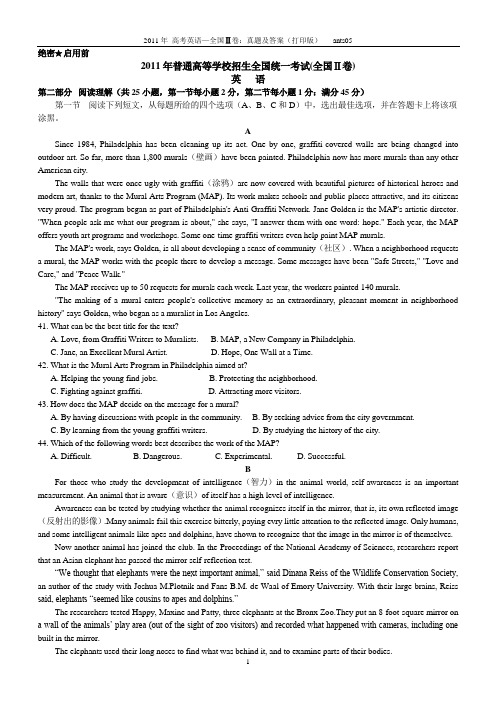
绝密★启用前2011年普通高等学校招生全国统一考试(全国Ⅱ卷)英语第二部分阅读理解(共25小题,第一节每小题2分,第二节每小题1分:满分45分)第一节阅读下列短文,从每题所给的四个选项(A、B、C和D)中,选出最佳选项,并在答题卡上将该项涂黑。
ASince 1984, Philadelphia has been cleaning up its act. One by one, graffiti-covered walls are being changed into outdoor art. So far, more than 1,800 murals(壁画)have been painted. Philadelphia now has more murals than any other American city.The walls that were once ugly with graffiti(涂鸦)are now covered with beautiful pictures of historical heroes and modern art, thanks to the Mural Arts Program (MAP). Its work makes schools and public places attractive, and its citizens very proud. The program began as part of Philadelphia's Anti-Graffiti Network. Jane Golden is the MAP's artistic director. "When people ask me what our program is about," she says, "I answer them with one word: hope." Each year, the MAP offers youth art programs and workshops. Some one-time graffiti writers even help paint MAP murals.The MAP's work, says Golden, is all about developing a sense of community(社区). When a neighborhood requests a mural, the MAP works with the people there to develop a message. Some messages have been "Safe Streets," "Love and Care," and "Peace Walk."The MAP receives up to 50 requests for murals each week. Last year, the workers painted 140 murals."The making of a mural enters people's collective memory as an extraordinary, pleasant moment in neighborhood history" says Golden, who began as a muralist in Los Angeles.41. What can be the best title for the text?A. Love, from Graffiti Writers to Muralists.B. MAP, a New Company in Philadelphia.C. Jane, an Excellent Mural Artist.D. Hope, One Wall at a Time.42. What is the Mural Arts Program in Philadelphia aimed at?A. Helping the young find jobs.B. Protecting the neighborhood.C. Fighting against graffiti.D. Attracting more visitors.43. How does the MAP decide on the message for a mural?A. By having discussions with people in the community.B. By seeking advice from the city government.C. By learning from the young graffiti writers.D. By studying the history of the city.44. Which of the following words best describes the work of the MAP?A. Difficult.B. Dangerous.C. Experimental.D. Successful.BFor those who study the development of intelligence(智力)in the animal world, self-awareness is an important measurement. An animal that is aware(意识)of itself has a high level of intelligence.Awareness can be tested by studying whether the animal recognizes itself in the mirror, that is, its own reflected image (反射出的影像).Many animals fail this exercise bitterly, paying evry little attention to the reflected image. Only humans, and some intelligent animals like apes and dolphins, have shown to recognize that the image in the mirror is of themselves.Now another animal has joined the club. In the Proceedings of the National Academy of Sciences, researchers report that an Asian elephant has passed the mirror self-reflection test.“We thought that elephants were the next important animal,” said Dinana Reiss of the Wildlife Conservation Society, an author of the study with Joshua M.Plotnik and Fans B.M. de Waal of Emory University. With their large brains, Reiss said, elephants “seemed like cousins to apes and dolphins.”The researchers tested Happy, Maxine and Patty, three elephants at the Bronx Zoo.They put an 8-foot-square mirror on a wall of the animals‟ play area (out of the sight of zoo visitors) and recorded what happened with cameras, including one built in the mirror.The elephants used their long noses to find what was behind it, and to examine parts of their bodies.Of the three, Happy then passed the test, in which a clear mark was painted on one side of her face. She could tell the mark was there by looking in the mirror, and she used the mirror to touch the mark with her long nose.Diana Reiss said, "We knew elephants were intelligent, but now we can talk about their intelligence in a better way."45. What can mirror tests tell us about animals?A. Whether they have large brains.B. Whether they have self-awareness.C. Whether they enjoy outdoor exercises.D. Whether they enjoy playing with mirrors.46. Why does the author mention apes and dolphins in the text?A. They are most familiar to readers.B. They are big favorites with zoo visitors.C. They are included in the study by Reiss.D. They are already known to be intelligent.47. What made Happy different from Maxine and Patty?A. She used her nose to search behind the mirror.B. She recognized her own image in the mirror.C. She painted a mark on her own face.D. She found the hidden camera.CStudent Membership-----Cambridge Arts CinemaCambridge Arts Cinema is one of the art houses in Britain and home of the internationally celebrated Cambridge Film Festival. Since 1947 generations of students have discovered the wealth of world cinema. Now you too can make most48. Which of the following is the most famous event held at Cambridge Arts Cinema?A. The Cambridge Film Festival.B. Meetings with filmmakers.C. The preview screening.D. Monthly premieres.49. If you're a member of Cambridge Arts Cinema, you will enjoy free .A. Darkroom Gallery showsB. mailed programmesC. special film eventsD. film shows50. How long will the membership for Cambridge Arts Cinema last?A. Four months.B. Eight months.C. Nine months.D. One year.51. For what purpose is the text written?A. Offering students cheaper tickets.B. Announcing the opening of a premiere.C. Telling the public of the cinema's address.D. Increasing the cinema's membership.DThe way we do things round hereSome years ago, I was hired by an American bank. I received a letter from the head of the Personnel Department that started, "Dear John, I am quite pleased that you have decided to join us." That "quite" saddened me. I thought he was saying "we're kind of pleased you decided to join us although I wish we had hired someone else." Then I discovered th at in American English "quite" sometimes means "very", while in British English it means "fairly".So the first lesson about working in other countries is to learn the language and by that I don't just mean the words people speak. It is body language, dress, manners, ideas and so on. The way people do things highlights many of the differences we see between cultures(文化).Some of these differences may be only on the surface-dress, food and hours of work-while others may be deeper and take longer to deal with. Mostly, it is just a question of getting used to the differences and accepting them, like the climate (气候),while getting on with business.Some of the differences may be an improvement. People are more polite; the service is better; you ask for something to be done and it happens without having to ask again. However, other differences can be troubling, like punctuality(准时). If you invite people to a party at 7 o'clock your guests will consider it polite to turn up exactly on time in Germany, five minutes early in the American Midwest, an hour early in Japan, 15 minutes afterwards in the UK, up to an hour afterwards in Italy and some time in the evening in Greece. I prefer not to use the word "late" because there is nothing wrong with the times people arrive. It is simply the accepted thing to do in their own country.52. The author was unhappy as mentioned in Paragraph 1 because he thought______.A. the American bank didn't think much of himB. the American bank might hire another personC. it's difficult to get used to American cultureD. it's easy to misunderstand Americans53. The word "highlights" in Paragraph 2 probably means_____.A. encouragesB. helps to narrowC. increasesD. draws attention to54. According to the author, what should we do with most cultural differences?A. Ask the native people for help.B. Understand and accept them.C. Do things in our own way.D. Do in-depth research.55. When invited to a party the people who are usually punctual are______.A. ItaliansB. GermansC. GreeksD. the BritishE"I didn't hear them call my name," explained Shelley Hennig to Active Teens (AT) as she talked about that exciting moment on national television when she won the honor of Miss Teen USA 2004. "Are you ready?" is what she heard. Then she said, "I shook my head no, and then they said …yes‟ and it was announced again."It was four days after that life changing moment for the seventeen-year-old high school student from Destrehan, Louisiana----she was still on cloud nine."I was so shocked! I never believed that it could actually really happen." Present in the audience(观众)that day were: her mother and father, older brother, her friends, and her dance teacher.Understanding why members of her family and her friends would be there, AT asked why herdance teacher had traveled so far to see her compete(比赛). "She's always been my role model. I've danced with her since I was six. She's been through so many difficulties and came through them all. I've learned to get over bad life's experiences and learned how to move on because of her."One of those bad life's experiences for Shelley happened three years ago when her brother Brad was killed in a drunk driving accident. He was 18. She found writing helped her get through the rough days. She said, "I write a lot about my brother. I write a lot, a lot, a lot...”As Miss Louisiana Teen, she traveled around the state speaking to teens(青少年)about the dangers of drinking and driving. In her role as Miss Teen USA, Sheiley will continue to speak to youth about safe driving, in addition to many other things to help the youth.When AT asked Miss Teen USA if she had any advice for our readers, she said, "Don't let anyone change you. Hang out with people that make you feel good about yourself. That way, it is easy to be yourself."56. What do the words “on cloud nine” in Paragraph 2 probably mean?A. frightenedB. troubledC. very happyD. very angry57. Shelley takes her dance teachers as a role medel mainly because she is .A. determinedB. friendlyC. strictD. experienced58. How many children did the Hennigs have according to the text?A. 1.B. 2.C. 3.D. 4.59. What did Shelley often do after she became Miss Louisiana Teen?A. She visited drunken drivers.B. She gave dance performance.C. She made speeches on safe driving.D. She helped other teens with their studies.60. What suggestion does Shelley give to the teens?A. Be yourself with the support of friends.B. Meet friends whenever possible.C. Go easy on yourself and others.D. Have a good role model.第二节根据对话内容,从对话后的选项中选出能填入空白处的最佳选项。
2011年考研英语二阅读第一篇
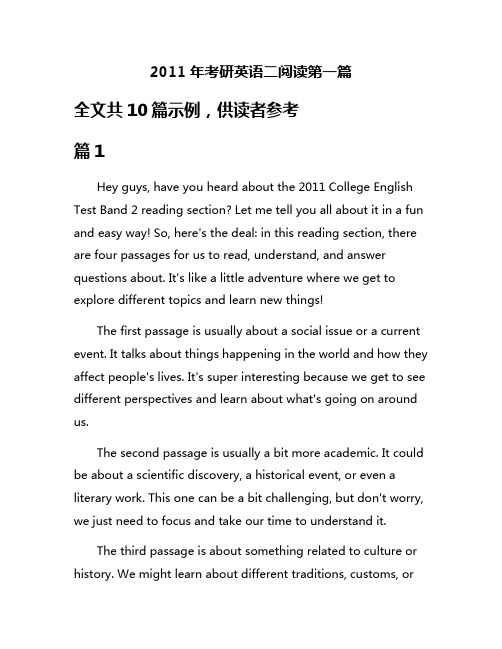
2011年考研英语二阅读第一篇全文共10篇示例,供读者参考篇1Hey guys, have you heard about the 2011 College English Test Band 2 reading section? Let me tell you all about it in a fun and easy way! So, here's the deal: in this reading section, there are four passages for us to read, understand, and answer questions about. It's like a little adventure where we get to explore different topics and learn new things!The first passage is usually about a social issue or a current event. It talks about things happening in the world and how they affect people's lives. It's super interesting because we get to see different perspectives and learn about what's going on around us.The second passage is usually a bit more academic. It could be about a scientific discovery, a historical event, or even a literary work. This one can be a bit challenging, but don't worry, we just need to focus and take our time to understand it.The third passage is about something related to culture or history. We might learn about different traditions, customs, orfamous figures from around the world. It's like taking a little trip to a new country without leaving our seat!The fourth passage is usually a bit lighter, like a personal story or an opinion piece. It's fun to read because we get to see how other people think and feel about different things. Plus, it helps us practice our reading comprehension skills.Overall, the reading section of the 2011 College English Test Band 2 is a great opportunity for us to learn, explore, and improve our English skills. So let's dive in, have fun, and do our best! Good luck, everyone!篇2Hello everyone, today I want to talk about the first reading passage in the 2011 English second entrance exam.The passage is about how people perceive the colors blue and green differently in different cultures. In Western countries, blue is often associated with calmness and sadness, while green represents freshness and health. But in China, blue is linked to masculinity and strength, while green symbolizes rage and jealousy. It's super interesting how the same colors can have such different meanings depending on where you are from!The passage also talks about how language can influence the way we see colors. For example, in Russian, there are different words for light blue and dark blue, which might make Russian speakers more sensitive to different shades of blue. It's crazy to think about how the language we speak can actually change the way we perceive the world around us.Overall, this passage really made me think about how culture and language can shape our perceptions of the colors we see every day. It's such a cool reminder that there's so much more to colors than just what meets the eye. I had so much fun reading and learning from this passage, and I can't wait to see what other interesting things the next reading passages have in store for us.That's all for now, thanks for listening to my summary of the first reading passage in the 2011 English second entrance exam! Have a great day everyone!篇3Hey guys! Today I want to talk to you about this reading passage from the 2011 English II exam. It's all about how humans are impacting the environment and what we can do to help.First off, the passage talks about how global warming is causing the ice to melt in the Arctic. This is really bad news foranimals like polar bears who rely on the ice to survive. But it's not just the polar bears who are in trouble, it's all of us. If we don't do something to stop global warming, we could see more extreme weather events like hurricanes and droughts.One way we can help is by reducing our carbon footprint. That means using less energy, driving less, and recycling more. We can also support renewable energy sources like solar and wind power. These clean energy sources don't release harmful greenhouse gases into the atmosphere like fossil fuels do.Another important point from the passage is how deforestation is harming the environment. Trees help clean the air by absorbing carbon dioxide and releasing oxygen. So when we cut down forests, we're not only destroying habitats for animals, but we're also making air pollution worse.To help stop deforestation, we can all do our part by planting trees, supporting sustainable forestry practices, and choosing products that are made from recycled materials.Overall, it's up to us to take care of our planet. We need to be mindful of our actions and make choices that will protect the environment for future generations. Let's work together to make a difference!篇4Hey guys, today I want to talk about the first passage of the 2011 GRE English II reading section. It was all about how technology is changing the way we learn and communicate. Pretty cool stuff!The passage talked about how technology like the internet and smartphones are making it easier for us to access information and connect with people all around the world. It also mentioned how some people think this is a great thing, while others are worried about the negative effects it might have on our brains and social skills.I thought it was really interesting to read about how technology is shaping our lives in so many ways. Like, I never realized how much I rely on my phone for everything from finding directions to keeping in touch with my friends. It's crazy to think about how different things were before all this tech stuff!Overall, I thought the passage was pretty easy to understand. There were some tricky words here and there, but I was able to figure them out by looking at the context. It was a fun read anddefinitely got me thinking about how technology is changing the world.So yeah, that's my take on the first passage of the 2011 GRE English II reading section. It was a cool topic and I can't wait to see what's next in the rest of the test!篇5Hey guys, have you heard about the 2011 Postgraduate Entrance Exam? Let me tell you all about the first reading passage in the English test!The passage is all about how music can affect our emotions and behavior. It talks about how music can make us feel happy or sad, calm or excited. Isn't that cool? I love listening to music, so this topic really caught my attention.The passage also mentions a study where people were asked to listen to different types of music while looking at pictures of faces showing different emotions. It turns out that the music they were listening to actually influenced how they perceived the emotions in the pictures. Can you believe that music has such a big impact on our brains?There's also a part in the passage where they talk about how music can help us communicate and understand each other better. I think that's so true! Music is like a universal language that everyone can understand and connect through. I always feel closer to my friends when we listen to music together.Overall, I think this passage is really interesting and it made me think a lot about how powerful music can be. I can't wait to see what other cool topics are in the exam this year!So, what do you guys think about the first reading passage? Let's chat about it!篇6Hey guys, today I'm going to talk about the first reading passage in the 2011 English II exam for the postgraduate entrance exam. It's all about how animals communicate, which is super cool!So, in the reading, it says that animals communicate in different ways, like using sounds, body movements, and even smells. For example, dolphins make clicking sounds to talk to each other underwater, how awesome is that? And did you know that bees dance to tell their friends where to find food? It's like a little bee dance party!But it's not just about making noises or dancing, animals also use body language to communicate. Like dogs wagging their tails when they're happy, or cats hissing when they're scared. It's so interesting to see how animals express their feelings without even saying a word.And guess what? Even plants communicate with each other! They release chemicals into the air to warn other plants of danger, like if there's a bug eating them. It's like they have their own secret language going on underground.Overall, this reading passage shows us just how amazing and complex the world of animal communication is. It's not just about words, it's about signals, gestures, and even scents. So next time you see a bird chirping or a squirrel twitching its tail, remember that they might be saying more than you realize! Just like how I'm telling you all this cool stuff about the reading passage. Pretty neat, right?篇7Hi everyone! Today, let's talk about the first reading passage from the 2011 National Entrance Examination for Master's Degree (English part). It's all about the evolution ofcommunication. Sounds cool, right? Let's dive in and explore together!The passage starts by introducing the importance of communication in our daily lives. It talks about how communication has evolved over time, from cave paintings and smoke signals to written language and digital communication. It's like a journey through history, showing how humans have always found ways to connect with each other.One interesting point the passage makes is about the role of technology in communication. It mentions how inventions like the printing press and the internet have revolutionized the way we communicate. It's crazy to think about how much our world has changed because of these technological advances.But it's not all rainbows and unicorns. The passage also touches on the negative effects of technology on communication. It talks about how social media can sometimes lead to misunderstandings and conflicts. It's a reminder that we need to be careful about how we use technology to communicate.In the end, the passage emphasizes the importance of effective communication in building relationships andunderstanding each other. It's a powerful reminder that communication is key to a harmonious society.So, what do you think about the evolution of communication? Have you ever thought about how technology has changed the way we connect with each other? Let me know your thoughts in the comments below!That's it for today's discussion on the first reading passage from the 2011 National Entrance Examination for Master's Degree. I hope you enjoyed exploring the evolution of communication with me. Thanks for reading, and see you next time!篇8Title: A Funny Story from My GrandmaHi everyone! Today I want to tell you a funny story that happened to my grandma. It was a sunny day, and my grandma was going to the market to buy some vegetables for dinner. As she was walking down the street, she saw a big dog running towards her. Grandma got scared and started running as fast as she could.But guess what? The dog was actually chasing a butterfly! It was jumping and barking happily, completely ignoring my grandma. When she realized this, she stopped running and started laughing. "Silly dog," she said, "chasing butterflies like a little kid."When she got to the market, she told everyone about the funny incident. They all laughed and said that they wished they could see it too. Grandma bought some fresh vegetables and headed back home, still chuckling to herself. She couldn't wait to tell Grandpa about what happened.When she got home, Grandpa was waiting for her with a big smile on his face. "What's so funny?" he asked. Grandma told him the whole story, and they both laughed so hard that tears came to their eyes.That day, my grandma learned that sometimes things are not as scary as they seem. And that even the most unexpected situations can bring laughter and joy. It's a story that I will always remember and cherish, and I hope it brought a smile to your face too.篇9Once upon a time, in the magical land of 2011, there was a big test called the GRE exam. It was a scary test that lots of smart people took to go to a special school called grad school. And in this test, there was a part called the Reading Comprehension.Now, the Reading Comprehension part had lots of reading passages that made people scratch their heads and say, "Huh?" But one brave little student named Timmy wasn't afraid. He put on his thinking cap and dove right in.The first passage was about something called "ecocentrism." Timmy didn't know what that word meant, but he read on. It talked about how some people thought that nature should be valued above all else. Timmy thought that sounded nice - he loved trees and animals too!The second passage was a bit trickier. It was about the history of architecture in ancient Greece. Timmy wasn't sure what all those fancy words meant, but he tried his best to understand. He learned about columns and temples and how they were all built a long time ago. It made Timmy feel like he was in a time machine!After reading all the passages, Timmy felt proud of himself. Even though some of the words were hard and he didn't know everything, he had tried his best. And that's all that mattered.So, the moral of the story is, even if you don't know all the answers, just keep trying. You never know what magical adventures you might find in the pages of a reading passage. The End.篇10Hey guys, today I'm gonna talk about the first reading passage of the 2011 National Postgraduate Entrance Examination ("2011"). So, grab your snacks and listen up!The passage is about the importance of sleep and how lack of sleep can affect our health and performance. It talks about how our body needs sleep to recharge and repair itself, and how not getting enough sleep can lead to all sorts of problems like memory loss, weight gain, and even serious health issues like heart disease and diabetes.I found this passage super interesting because I never really thought about how important sleep is before. I mean, I love staying up late watching TV or playing video games, but now I realize that I need to make sure I'm getting enough sleep to stay healthy and do well in school.The passage also talks about ways to improve our sleep, like having a routine bedtime, turning off screens before bedtime,and creating a comfortable sleep environment. I'm definitely gonna try some of these tips to see if they help me sleep better.Overall, I think this passage is a reminder for all of us to prioritize our sleep and take care of our health. So, let's all try to get a good night's sleep tonight and every night! Good night, everyone!。
2011年考研英语一阅读3
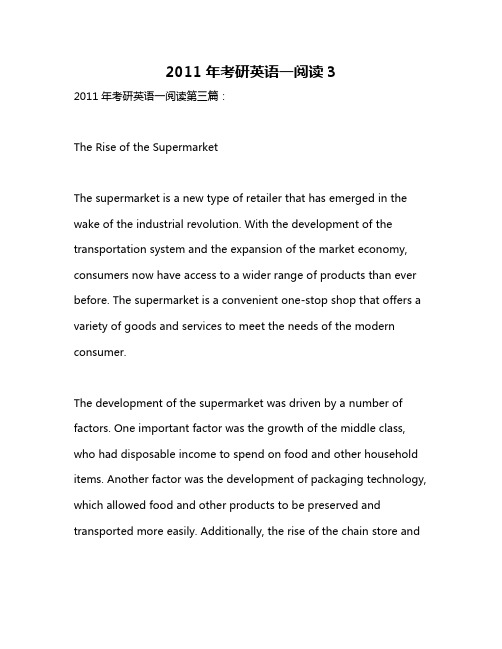
2011年考研英语一阅读32011年考研英语一阅读第三篇:The Rise of the SupermarketThe supermarket is a new type of retailer that has emerged in the wake of the industrial revolution. With the development of the transportation system and the expansion of the market economy, consumers now have access to a wider range of products than ever before. The supermarket is a convenient one-stop shop that offers a variety of goods and services to meet the needs of the modern consumer.The development of the supermarket was driven by a number of factors. One important factor was the growth of the middle class, who had disposable income to spend on food and other household items. Another factor was the development of packaging technology, which allowed food and other products to be preserved and transported more easily. Additionally, the rise of the chain store andthe emergence of the franchise model provided supermarkets with a proven business model and an efficient way to expand.The growth of the supermarket has had a profound impact on the retail industry. It has made shopping more convenient for consumers, as they can find everything they need under one roof. The supermarket has also been a driving force in the development of private labels, as supermarkets often offer their own brands of products to compete with national brands. Finally, the supermarket has had a significant impact on the agricultural industry, as it has increased demand for certain crops and changed the way farmers produce their goods.In conclusion, the supermarket is a key part of the retail industry and has transformed shopping for consumers. It has also had a profound impact on other industries, including transportation, packaging, and agriculture. As the supermarket continues to evolve, it will continue to meet the changing needs of consumers and drive economic growth.。
2011中考英语阅读理解题及答案10篇
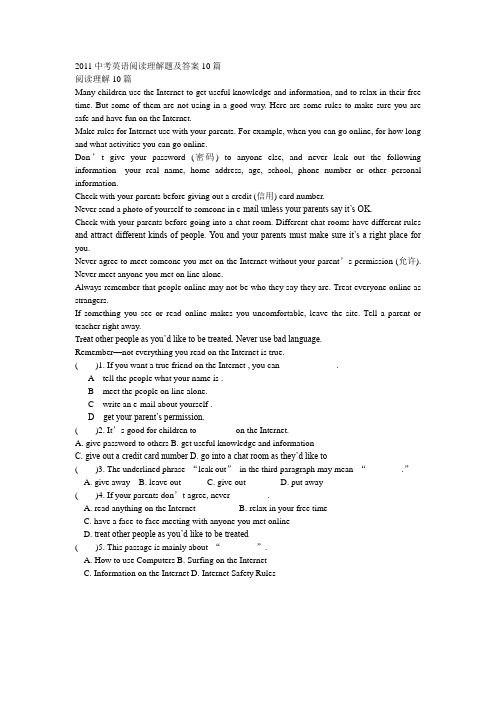
2011中考英语阅读理解题及答案10篇阅读理解10篇Many children use the Internet to get useful knowledge and information, and to relax in their free time. But some of them are not using in a good way. Here are some rules to make sure you are safe and have fun on the Internet.Make rules for Internet use with your parents. For example, when you can go online, for how long and what activities you can go online.Don’t give your password (密码) to anyone else, and never leak out the following information---your real name, home address, age, school, phone number or other personal information.Check with your parents before giving out a credit (信用) card number.Never send a photo of yourself to someone in e-mail unless your parents say it‘s OK.Check with your parents before going into a chat room. Different chat rooms have different rules and attract different kinds of people. You and your parents must make sure it‘s a right place for you.Never agree to meet someone you met on the Internet without your parent’s permission (允许). Never meet anyone you met on line alone.Always remember that people online may not be who they say they are. Treat everyone online as strangers.If something you see or read online makes you uncomfortable, leave the site. Tell a parent or teacher right away.Tr eat other people as you‘d like to be treated. Never use bad language.Remember—not everything you read on the Internet is true.()1. If you want a true friend on the Internet , you can ____________ .A tell the people what your name is .B meet the people on line alone.C write an e-mail about yourself .D get your parent‘s permission.()2. It’s good for children to ________ on the Internet.A. give password to othersB. get useful knowledge and informationC. give out a credit card numberD. go into a chat room as they‘d like to()3. The underlined phrase “leak out”in the third paragraph may mean “________.”A. give away B. leave out C. give out D. put away()4. If your parents don’t agree, never ________.A. read anything on the InternetB. relax in your free timeC. have a face-to face meeting with anyone you met onlineD. treat other people as you‘d like to be treated()5. This passage is mainly about “________”.A. How to use ComputersB. Surfing on the InternetC. Information on the InternetD. Internet Safety RulesDo you know why different animals or pests (昆虫) have their special colors? Colors in them seem to be used mainly to protect themselves.Some birds like eating locusts (蝗虫), but birds cannot easily catch them. Why? It is because locusts change their colors together with the change of the colors of crops(庄稼). When crops are green, locusts look green. But as the harvest time comes, locusts change to the same brown color as crops have. Some other pests with different colors from plants are easily found and eaten by others. So they have to hide themselves for lives and appear only at night.If you study the animal life, you’ll find the main use of coloring is to protect themselves. Bears, lions and other animals move quietly through forests. They cannot be easily seen by hunters (猎人). This is because they have the colors much like the trees.Have you ever noticed an even stranger act? A kind of fish in the sea can send out a kind of very black liquid (液体)when it faces danger. While the liquid spreads over (散开), its enemies (敌人)cannot find it. And it immediately swims away. So it has lived up to now though it is not strong at all.()1.From the passage we learn that locusts________.A. are small animalsB. are easily found by birdsC. are dangerous to their enemiesD. change their colors to protect themselves()2.How can pests with different colors from plants keep out of danger?A. They run away quickly.B. They have the colors much like their enemies.C. They hide themselves by day and appear at night.D. They have to move quietly.()3.Bears and lions can keep safe because _________.A. they have the colors much like the treesB. they move quietlyC. they like brown and gray colorsD. they live in forests()4.Why can the kind of fish live up to now?A. Because it is very and strong.B. Because the liquid it sends out can help it escape from its enemies.C. Because the liquid it sends out can kill its enemies.D. Because it swims faster than any other fish.()5.Which is the best title for this passage?A. The Change of Colors for Animals and PestsB. Colors of Different Animals and PestsC. The Main Use of Colors for Animals and PestsD. Some Animals and PestsCIn 1993 an unknown American called Clarence Nash went to see the filmmaker Walt Disney. He had an unusual voice and he wanted to work in Disney’s cartoon(动画片) film for children. When Walt Disney heard Nash’s voice, he said ”Stop! That’s our duck!”The duck was the now-famous Donald Duck, who first appeared in 1934 in the firm The Wise Little Hen. Donald lived in an old houseboat(水上住家) and wore his sailor jacket and hat. Later that year he became a star after an eight –minute Mickey Mouse film. The cinema audience liked him because he was lazy and greedy(贪婪的), and because he lost his temper (发脾气) very quickly. And they loved his voice when he became angry with Mickey’s eight nephews(侄子). Soon Donald was more popular than Mickey Mouse himself, probabl y because he wasn‘t a goody-goody like Mickey.In the 1930S, ‗ 40s and ‗ 50s Donald and h is friends Mickey, Goofy and Pluto made hundreds of Disney cartoons. He also made educational films about the place of the USA in the world, and safety in the home. Then in 1966 Donald Duck and his voice disappeared – there were no more new cartoons.Clare nce Nash died in February, 1985. But today‘s children can still see the old cartoons on television and hear that famous voice.()1. Who made Donald Duck film? ______A. Mickey Mouse.B. Clarence Nash.C. Walt Disney.D. Pluto.()2. When was the first Donald Duck film made? ______A. In 1933.B. In 1934.C. In 1966.D. In 1930.()3. Who was Clarence Nash? ______A. A cartoonist.B. Donald Duck‘s voice.C. A film-maker.D. A film star.()4. Where do today’s children see Donald Duck ? ______A. In new film.B. At the cinema.C. On television.D. At concerts.()5. The underlined word ”audience”in the second paragraph means______ .A. readsB. formal interviewC. law freedomD. the people who watch a film at a cinemaDThere once lived in China a very foolish king and queen. One day the queen had a baby daughter. When they saw their baby, they both cried out, ―My goodness! How small it is! It‘s hairless and toothless! It‘s a monster!‖ They sent for all the doctors in the country and ordered them to prepare some medicine for her.“When she drinks your medicine, she must grow to the right size and have hair and teeth,‖ the king said, ―If you don‘t do this, you‘ll have a beating.‖The doctors thought it imposs ible, but they dared not say anything against the king‘s order. Just then and old doctor stepped forward. ―Oh, we shall certainly obey your order,‖ he said, ―but it takes time. We have to dig a mineral from the KunLun Mountains when the snow melts for the second time. The snow melts on those mountains only once in six years. So we need twelve years.‖At last the king agreed and the doctors took away the little princess. On her twelfth birthday, they brought her back to her parents with long black hair and beautiful teeth. The king and queen were very happy and gave the doctors expensive presents.()1.Which of the following words makes the sentence untrue? The baby was ______.A. ToothlessB. hairlessC. unusualD. small()2.The doctors would be beaten if ______.A. the baby daughter didn‘t drink their medicineB. they refused to obey the king‘s orderC. the baby daughter grew to the right sizeD. the baby daughter became a monster()3.The old doctor wanted to keep the king’s daughter for twelve years because ______.A. they needed a lot of different plantsB. they need a lot of different mineralsC. this would give the baby time to grow upD. they had to dig a mineral the snow melted for the second time()4.The doctors thought it impossible ______.A. for them to change the king‘s orderB. for them the prepare the medicine in twelve yearsC. for the small baby to drink the medicineD. for them to make the baby have teeth and hair or grow teeth at once()5.______ the king wouldn’t have given them expensive presents.A. Had the doctors not brought back a beautiful girlB. If the doctors hadn‘t found the mineralsC. Had the doctors not been able to prepare the magic medicineD. If the daughter were still a monster twelve years laterLong ago ,there lived in Greece a learned man. He was so well known for his good knowledge of almost everything that lots of people from all over the country came to learn from him. The great man taught his students whole-heartedly and answered their questions with great patience.One day a student asked him, ― My dear teacher, didn‘t you say you yourself have many ,many more questions about things than we do? But I think we students have far more than you.‖With a smile on his face, the teacher drew two circles ,one as large as a big cake, the other smaller. Then he said , ―Of course, I have learned much more. But it‘s wrong to think that a teacher has fewer questions than his students. Now, look at these two circles. The inside of the bigger one is my knowledge of things, and the inside of the smaller one is yours. Out of the circles is what is still unknown to us. Since mine is larger, I have to use the longer line to draw the bigger circle. That means I have more opportunities to face what is still unknown. And that‘s why I myself have more questions than you do. The more you learn , the more questions you have. You will never learn enough ,you know.‖()1. The learned man drew two circles to show _____.A. he was good at drawing circlesB. his knowledge had something to do with the circlesC. why he had more questions than the studentsD. how he could get more knowledge()2. The student didn’t agree that ______.A. the teacher had so many questions as a learned manB. the teacher had so many questionsC. the students had fewer questions than the teacherD. the students had more questions than 0the teacher()3. The teacher was famous for his ______.A. kindnessB. knowledgeC. patienceD. questions()4. From the passage we can learn that_____.A. the more questions we have, the more knowledge we may getB. it‘s never too old to learnC. every one of us should try to be a learned manD. a teacher should have many questions( )5.Which of the following shows us what the teacher drew?FMany people go to school for an education. They learn languages, history, politics, geography, physics, chemistry and mathematics. Others go to school to learn a skill so that they can make a living. School education is very important and useful .Yet, no one can learn everything from school. A teacher, no matter how much he knows, can not teach his students everything they wantto know. The teacher‘s job is to show his students how to learn. He teaches them how to read and how to think. So, much more is to be learned outside school by the students themselves.It is always more important to know how to study by oneself than to memorize some facts or a formula. It is actually quite easy to learn a certain fact in history or a formula in mathematics. But it is very difficult to use a formula in working out a math problem. Great scientists before us did n‘t get everything from school .Their teachers only showed them the way. Edison did not even finish primary school. But they were all so successful. They invented so many things for mankind. The reason for their success is that they knew how to study. They read books that were not taught at school . They would ask many questions as they read. They did thousands of experiments. They worked hard all their lives, wasting not a single moment. Above all , they knew how to use their brain.()1. People go to school to _______.A. learn several subjectsB. make a livingC. get an educationD. to learn a skill()2. According to the passage, the most important thing a teacher should do is________.A. to teach his students everything he knowsB. to know everythingC. to teach the students how to thinkD. to teach the students how to study by themselves()3. To work out a math problem ,you need to know ________.A. only a certain formulaB. how to memorize some factsC. only some factsD. the method to work it out()4. Why were many scientists so successful?A. They received good education.B. They were very clever.C. They knew how to learn.D. They learned lots of facts and formulas.()5. How did great scientists study?A. They read a lot of books and asked many questions while reading.B. They did thousands of experiments.C. They always worked hard and never wasted time.D. All of the above.GA Children RestaurantIn Amsterdam, the capital of Holland, there is a unique Children Restaurant. It is run wholly by the children. From the manager to the cooks, cashiers, waiters or waitresses and other staff members are all children form 6 to 12 years old. They themselves do all the necessary work suchas cooking and cleaning. These children are selected in Amsterdam. After training, they may serve in the Restaurant for four weeks. All of them are willing to work there and they are very proud of the work.This Restaurant was founded in 1983 by a woman cook, who wanted to give the children chances to learn to be useful to the society. And now she is the only adult there, but her job is just to take care of the children.The Restaurant is welcomed almost by everyone. Since there are only 20 seats in the restaurant, it is always very crowded.So you should make a reservation months in advance. The cost of a meal differs according to the customers. Usually US $ 4 for each adult, but much cheaper for the children. And its business hours are only on Saturday evenings and Sunday afternoons.()1. The children in this restaurant__________________.A. can earn only four dollars a dayB. are fond of working thereC. will have to work there for over a monthD. do all the work except cooking()2. The word “cashier”in the first passage perhaps means_________________.A. a person who cooks foodB. a person who does cleaningC. a person who receives and pays out money in a restaurant etc.D. a person who serves food to customers()3. Which can be TRUE according to this passage ?A. All the children in the restaurant form AmsterdamB. If you don‘t order a meal a month ahead of time, you will get no food in the city.C. Everybody likes the Restaurant , so it is often filled with customers.D. In Amsterdam, any child between 6 and 12 can work in this Restaurant if he likes()4. Which is NOT true according to the writer?A. This Restaurant has a history of about 20 years.B. For the same meal a child will pay less while an adults pay more.C. The woman who set up this Restaurant used to be a cook.D. There are more than a score of seats.()5. The Children Restaurant was managed by_______________.A. the government of AmsterdamB. a woman cookC. the children themselvesD. one of the children‘s parentsKey: 1.B 2. C 3.A 4.D 5.CHMark Twain‘s First MoneyMark Twain was asked one day if he could remember the first money he ever earned.He thought a long time and then said , ―Yes, it was at school. I can remember everything about it . School boys in those days did not take good care of their chairs and desks. There was a rule in ourschool that if anyone damaged his desk or chair, he would have to pay five dollars or the teacher would beat him in front of the whole school.‖“One day I damaged my desk in some way, I had to pay five dollars or be beaten before the whole school. My father said it would be too bad to have our family disgraced in front of the whole school. He agreed to give me five dollars to hand over the teacher. But before he gave me the mon ey, he took me upstairs and gave me a beating.‖“But as I had one beating and I decided I would take another beating at school and keep the five dollars. So that‘s what I did. That was the first money I ever earned.‖()1. Mark Twain earned his first money _________.A. when he was a pupilB. when he became a writerC. when he taught at a schoolD. when he was beaten by his father()2. The school made the rule so that they could_____.A. teach the students wellB. give the students a beatingC. keep the desks and chairs wellD. ask the students for more money()3. Mark Twain’s father______.A. was happy to give him the moneyB. got angry when he knew what Mark Twain had done at schoolC. said sorry to the teacher when he heard the newsD. agreed to beat Mark Twain and then give him the money()4. Mark Twain’s father thought if he gave Mark Twain the money______.A. he would not be beaten in front of the whole schoolB. he would go to the school againC. he would never do that againD. he would earn the money()5. Mark Twain was beaten_______.A. at homeB. only by his fatherC. at schoolD. both at school and at home()6. Mark Twain______.A. gave the money to the teacherB. bought a desk for the schoolC. asked his father to go upstairsD. kept the money for himself()7. Mark Twain’s father neat him because________.A. he wanted to teach the boy a lessonB. he didn‘t want the boy to be beaten by the teacherC. he didn‘t want to give him the moneyD. he didn‘t want to have his family disgracedIThe Piano ConcertA young woman in a small German town was going to give a piano concert. Her posters said that she was a pupil of Franz Liszt, the great Hungarian pianist..This was not true.One day the woman learned that Liszt himself was in town. Now people would find out that, she would never be able to give a concert again . What should she do?Finally she went to see the famous man himself. She told him everything .Her parents were dead and she was alone. She had to make a living. She decided to give piano lessons to rich children. But who would send their children to an unknown young woman? She told people that Franz Liszt was her teacher.“I believe you,‖ Liszt said , ― You have done wrong, but I can see you are truly sorry about it. That‘s enough. Now let me hear you play.‖The young woman was shy at first ,But then she saw Liszt smiling. It made her feel better. Now she wasn‘t afraid any more. She started play ing .She put her heart into it and she played wonderfully, Liszt was quite pleased.When she finished , she turned to look at Liszt. There was a smile on his face. She could see he was pleased. Then Liszt gave her some advice, After he finished , he said, ― Now you really are my pupil. Go ahead with your concert. And you can add a note to the posters. Say that your teacher himself will be there. He will play the last piece.‖()1.A pupil of Franz Liszt was going to give a piano concert in a small German town before the great pianist himself came.()2.Franz Liszt himself went to say something to the woman about her mistake.()3.When the woman knew the pianist came to town, she was very worried and afraid.()4.In fact the woman played the piano very well.()5.At last Franz Liszt took the young woman as his pupil.JFire can help people in many ways. But can also be very harmful. Fire can heat water warm your houses, give light, and cook food. But fire can burn things too. It can burn trees, houses, animals, or people. Sometimes big fires can burn forests.Nobody knows for sure how people began to use fire. But there are many interesting, old stories about the first time a man or woman started a fire. One story from Australia tells about a man very, very long time ago. He went up to the sun by a rope and brought fire down.Today people know how to make a fire with matches. Children sometimes like to play with them. But matches can be very dangerous. One match can burn a piece of paper, and then it might burn a house. A small fire can become a big fire very fast.Fires kill many people every year. So you must be careful with matches. You should also learn to put out fires. Fires need oxygen. Without oxygen they die. There is oxygen in the air. Cover a fire with water, sand, or in an emergency, with your coat or something else. This keeps the air away from a fire and kills it.Be careful with fire, and it will help you. Be careless with fire, and it will burn you.()1. Which is true?A. We are not sure how people started to use fire.B. It is an Australian who started a fire.C. We know how people began to use fire.D. Nobody knows how to make a fire.()2. Children mustn’t play with matches because ______.A. matches burn paperB. it is not interestingC. matches can be dangerousD. they don‘t know how to make a fire with matches ()3. If you are going to put out a fire, you ______.A. must be careful with matchesB. ought to know it can be harmfulC. have to cover it with water onlyD. should keep air away from it()4. We must be careful with fire, or it ______.A. can beB. warms our housesC. might burn usD. will help us()5. What is the main idea of the passage?A. Fire can help people in many ways.B. Fire can be both helpful and harmful.C. Fire can burn things and peopleD. We must be careful with matches.。
2011 考研英语阅读真题Text 2(英语二)
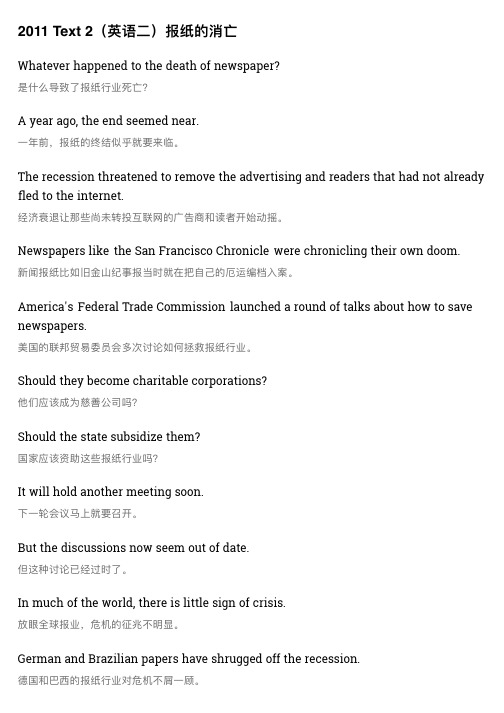
2011 Text 2(英语⼆)报纸的消亡Whatever happened to the death of newspaper?A year ago, the end seemed near.The recession threatened to remove the advertising and readers that had not already fled to the internet.Newspapers like were chronicling their own doom.America's launched a round of talks about how to save newspapers.Should they become charitable corporations?Should the state subsidize them?It will hold another meeting soon.But the discussions now seem out of date.In much of the world, there is little sign of crisis.German and Brazilian papers have shrugged off the recession.是什么导致了报纸⾏业死亡?⼀年前,报纸的终结似乎就要来临。
经济衰退让那些尚未转投互联⽹的⼴告商和读者开始动摇。
the San Francisco Chronicle 新闻报纸⽐如旧⾦⼭纪事报当时就在把⾃⼰的厄运编档⼊案。
Federal Trade Commission 美国的联邦贸易委员会多次讨论如何拯救报纸⾏业。
他们应该成为慈善公司吗?国家应该资助这些报纸⾏业吗?下⼀轮会议⻢上就要召开。
但这种讨论已经过时了。
放眼全球报业,危机的征兆不明显。
德国和巴⻄的报纸⾏业对危机不屑⼀顾。
2011年英语一阅读第一篇
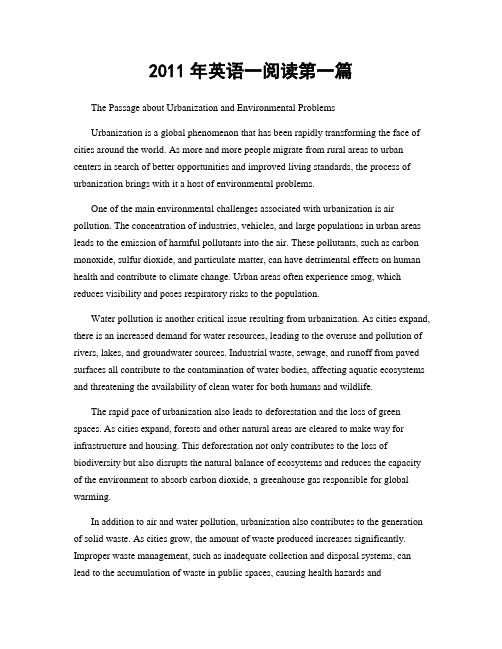
2011年英语一阅读第一篇The Passage about Urbanization and Environmental ProblemsUrbanization is a global phenomenon that has been rapidly transforming the face of cities around the world. As more and more people migrate from rural areas to urban centers in search of better opportunities and improved living standards, the process of urbanization brings with it a host of environmental problems.One of the main environmental challenges associated with urbanization is air pollution. The concentration of industries, vehicles, and large populations in urban areas leads to the emission of harmful pollutants into the air. These pollutants, such as carbon monoxide, sulfur dioxide, and particulate matter, can have detrimental effects on human health and contribute to climate change. Urban areas often experience smog, which reduces visibility and poses respiratory risks to the population.Water pollution is another critical issue resulting from urbanization. As cities expand, there is an increased demand for water resources, leading to the overuse and pollution of rivers, lakes, and groundwater sources. Industrial waste, sewage, and runoff from paved surfaces all contribute to the contamination of water bodies, affecting aquatic ecosystems and threatening the availability of clean water for both humans and wildlife.The rapid pace of urbanization also leads to deforestation and the loss of green spaces. As cities expand, forests and other natural areas are cleared to make way for infrastructure and housing. This deforestation not only contributes to the loss of biodiversity but also disrupts the natural balance of ecosystems and reduces the capacity of the environment to absorb carbon dioxide, a greenhouse gas responsible for global warming.In addition to air and water pollution, urbanization also contributes to the generation of solid waste. As cities grow, the amount of waste produced increases significantly. Improper waste management, such as inadequate collection and disposal systems, can lead to the accumulation of waste in public spaces, causing health hazards andenvironmental degradation. Landfills, where the waste is often dumped, pose additional risks as they can contaminate soil and water sources if not properly designed and maintained.To address these environmental problems associated with urbanization, governments and city planners must prioritize sustainable urban development. This includes implementing policies and regulations to reduce air and water pollution, promoting the use of renewable energy sources, improving waste management systems, and preserving green spaces.Investing in public transportation and encouraging the use of bicycles and walking can help reduce air pollution and ease traffic congestion in urban areas. Implementing stricter emission standards for vehicles and industries can also significantly reduce air pollution.Efficient water management systems, such as wastewater treatment plants and rainwater harvesting, can help alleviate water pollution and ensure a sustainable water supply. Encouraging water conservation practices, such as water-efficient appliances and education campaigns, can also contribute to addressing this issue.Furthermore, reforestation and the preservation of green spaces within cities are essential to counteract the negative effects of deforestation. Creating urban parks and rooftop gardens not only improves air quality but also provides recreational spaces for residents.In conclusion, urbanization brings about a range of environmental problems, including air and water pollution, deforestation, and solid waste generation. However, through sustainable urban development and the implementation of appropriate policies and practices, these issues can be mitigated. It is crucial for governments, city planners, and individuals to work together to ensure that urbanization is accompanied by environmentally responsible practices and the preservation of a healthy and sustainable urban environment.。
2011英语一第三篇阅读
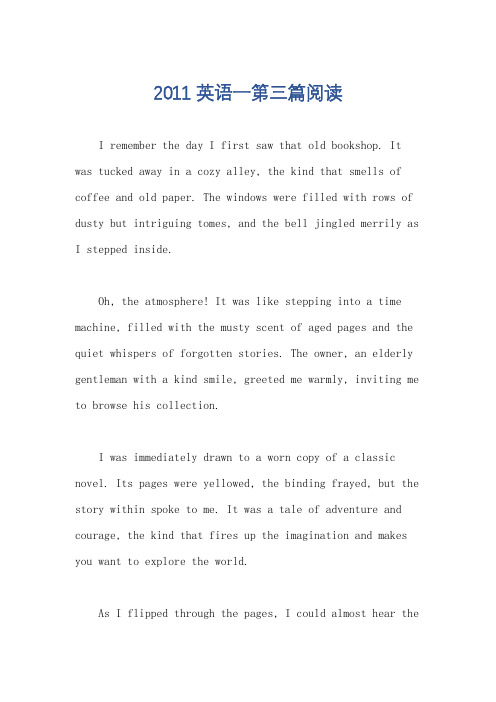
2011英语一第三篇阅读I remember the day I first saw that old bookshop. It was tucked away in a cozy alley, the kind that smells of coffee and old paper. The windows were filled with rows of dusty but intriguing tomes, and the bell jingled merrily as I stepped inside.Oh, the atmosphere! It was like stepping into a time machine, filled with the musty scent of aged pages and the quiet whispers of forgotten stories. The owner, an elderly gentleman with a kind smile, greeted me warmly, inviting me to browse his collection.I was immediately drawn to a worn copy of a classic novel. Its pages were yellowed, the binding frayed, but the story within spoke to me. It was a tale of adventure and courage, the kind that fires up the imagination and makes you want to explore the world.As I flipped through the pages, I could almost hear theechoes of past readers' thoughts and dreams. I imagined them sitting in this same spot, lost in the world of words, just like me. It was a magical moment, one that I'll cherish forever.Before leaving, I bought that book as a keepsake. It sits on my shelf now, a reminder of that special day and the joy of discovering hidden treasures. And whenever I'm feeling blue or need a little inspiration, I just open it up and let the story take me away.。
2011考研英语一阅读理解逐句翻译
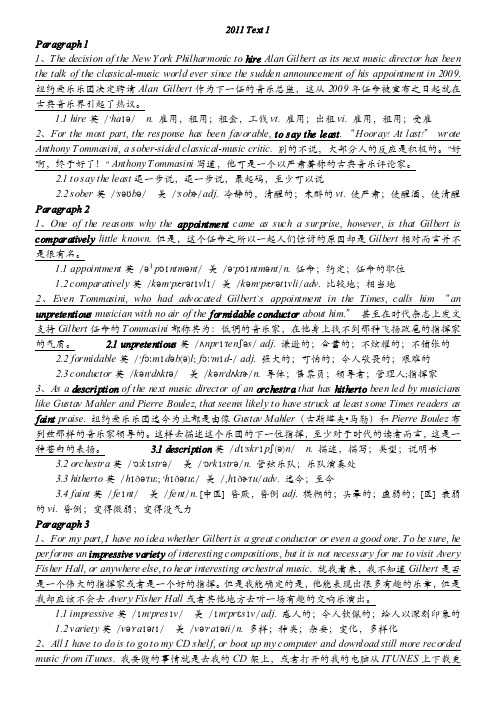
2011 Text 1Paragraph 11、The decision of the New York Philharmonic to hire Alan Gilbert as its next music director has been the talk of the classical-music world ever since the sudden announcement of his appointment in 2009. 纽约爱乐乐团决定聘请Alan Gilbert作为下一任的音乐总监,这从2009年任命被宣布之日起就在古典音乐界引起了热议。
1.1 hire英/'haɪə/ n. 雇用,租用;租金,工钱vt. 雇用;出租vi. 雇用,租用;受雇2、For the most part, the response has been favorable, to say the least. “Hooray! At last!” wrote Anthony Tommasini, a sober-sided classical-music critic. 别的不说,大部分人的反应是积极的。
"好啊,终于好了!" Anthony Tommasini写道,他可是一个以严肃著称的古典音乐评论家。
2.1 to say the least退一步说,退一步说,最起码,至少可以说2.2 sober英/'səʊbə/ 美/'sobɚ/adj. 冷静的,清醒的;未醉的vt. 使严肃;使醒酒,使清醒Paragraph 21、One of the reasons why the appointment came as such a surprise, however, is that Gilbert is comparatively little known. 但是,这个任命之所以一起人们惊讶的原因却是Gilbert相对而言并不是很有名。
2011年高考英语真题阅读理解译文(全国卷)

2011年普通高等学校招生全国统一考试(全国卷)英语第三部分阅读理解第一节A当牛奶来敲门20世纪60年代,我在新泽西州长大,当时,我们有一位送奶工会把牛奶送到我们家门口。
他的名字叫Basille先生。
他头戴着一顶白色帽子,开着一辆白色卡车。
对于一个5岁的孩子来说,我总是情不自禁地盯着他系在腰带上的自动换币机看。
有一天他在送奶时注意到了我这个行为,就从自动换币机里取出二十五分的硬币给了我。
当然,他送的不只是牛奶,还有奶酪、鸡蛋等等。
如果我们需要改变我们的订单,我母亲就写一个便条——“下次送奶时请增加一瓶酪乳”,然后连同空瓶一起放在箱子里。
所有的这些都不仅仅是便利,还有家家户户和他们的送奶工亲密的关系。
Basille先生甚至都有我们家的钥匙,因为有段日子外面太冷我们只好把奶箱放到室内,这样牛奶就不会冻住。
我记得Basille先生时不时在我家厨房餐桌旁歇息,喝杯茶,还一边讲述他送奶的故事。
难过的是,如今却没有送奶上门的服务了。
大公司获准生产价格更为便宜的牛奶,这使送奶工很难与其竞争。
此外,到处都有售卖牛奶的地方,这也还有,牛奶随处可买,因此,送奶服务可能就没有实用性了。
最近,我在农村看到的一个老旧的牛奶箱勾起了我对儿时的回忆。
我将它带了回来装在了后门的门廊上。
每每我儿子的朋友们问到这是什么的时候,我就跟他们讲起我孩提时候的故事,还有那个既给我们送来牛奶又为我们带来友谊的送奶工人的故事。
B似乎高大有其显而易见的不适之处,而矮小有其美好之处,尤其是在宾馆住宿和在餐馆就餐的时候。
六个月前为了发起满足高个子人群需求的运动而成立的“大不列颠高个子俱乐部”(TPCGB)已经将其目光聚焦到了宾馆和饭店。
这个俱乐部表示,宾馆里的床太小,淋浴喷头太低,饭店的桌子底下几乎没有放腿的空间,这些都给那些超出平均身高的人带来了很多生活上的困难。
然而,不仅仅是那些大高个儿们的需求得不到满足,现在人口的平均身高在不断上升,但是床铺、门廊、和椅子的尺寸却一直没有变化。
2011年英语一阅读第三篇
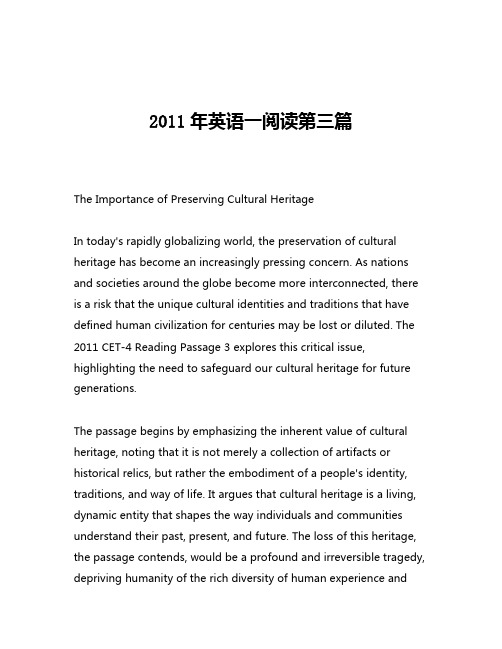
2011年英语一阅读第三篇The Importance of Preserving Cultural HeritageIn today's rapidly globalizing world, the preservation of cultural heritage has become an increasingly pressing concern. As nations and societies around the globe become more interconnected, there is a risk that the unique cultural identities and traditions that have defined human civilization for centuries may be lost or diluted. The 2011 CET-4 Reading Passage 3 explores this critical issue, highlighting the need to safeguard our cultural heritage for future generations.The passage begins by emphasizing the inherent value of cultural heritage, noting that it is not merely a collection of artifacts or historical relics, but rather the embodiment of a people's identity, traditions, and way of life. It argues that cultural heritage is a living, dynamic entity that shapes the way individuals and communities understand their past, present, and future. The loss of this heritage, the passage contends, would be a profound and irreversible tragedy, depriving humanity of the rich diversity of human experience andexpression.One of the key points made in the passage is the threat posed by globalization to the preservation of cultural heritage. As the world becomes increasingly interconnected through advances in technology, communication, and transportation, there is a risk that local and regional cultures may be overshadowed by dominant, homogenized global cultures. The passage cites examples of traditional art forms, languages, and customs that have already begun to disappear or become marginalized as a result of this process.However, the passage also acknowledges the potential benefits of globalization, such as the increased exchange of ideas, the cross-pollination of cultural influences, and the opportunity for greater mutual understanding and appreciation among peoples. The challenge, then, is to find a balance between embracing the positive aspects of globalization while still preserving the unique cultural identities that give meaning and richness to human experience.To this end, the passage outlines several strategies for effective cultural heritage preservation. One key approach is the active involvement of local communities in the identification, documentation, and protection of their own cultural assets. The passage argues that communities are best positioned to understandthe significance and nuances of their own cultural traditions, and that their participation is essential for ensuring the long-term viability of these traditions.Another important strategy is the development of comprehensive legal and policy frameworks to safeguard cultural heritage. The passage highlights the role of international organizations, such as UNESCO, in establishing conventions and guidelines for the protection of cultural heritage, as well as the need for national and regional governments to enact and enforce relevant laws and regulations.The passage also emphasizes the importance of education and public awareness in promoting the value of cultural heritage. By instilling a sense of pride and appreciation for cultural traditions in young people, and by fostering greater public understanding of the significance of cultural heritage, the passage argues that we can help to ensure its preservation for future generations.Finally, the passage underscores the economic and social benefits of cultural heritage preservation. It notes that the tourism industry, for example, can provide a sustainable source of income for communities that are able to effectively showcase and share their cultural assets. Moreover, the passage suggests that the preservation of cultural heritage can contribute to social cohesion, communityresilience, and overall well-being.In conclusion, the 2011 CET-4 Reading Passage 3 makes a compelling case for the urgent need to preserve cultural heritage in the face of the challenges posed by globalization. By recognizing the inherent value of cultural diversity, engaging local communities, developing robust policy frameworks, and fostering public awareness, we can work to ensure that the rich tapestry of human civilization is passed down to future generations. Ultimately, the preservation of cultural heritage is not only a moral imperative, but also a crucial investment in the continued flourishing of humanity as a whole.。
2011考研英语阅读翻译(正文+选项)
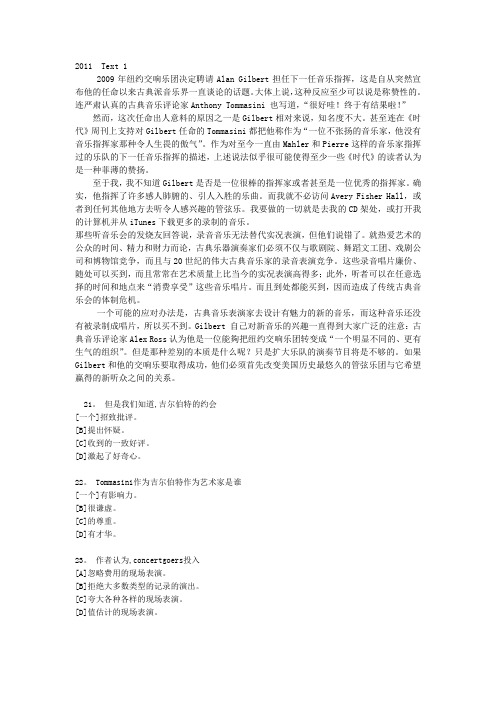
2011 Text 12009年纽约交响乐团决定聘请Alan Gilbert担任下一任音乐指挥,这是自从突然宣布他的任命以来古典派音乐界一直谈论的话题。
大体上说,这种反应至少可以说是称赞性的。
连严肃认真的古典音乐评论家Anthony Tommasini 也写道,“很好哇!终于有结果啦!”然而,这次任命出人意料的原因之一是Gilbert相对来说,知名度不大。
甚至连在《时代》周刊上支持对Gilbert任命的Tommasini都把他称作为“一位不张扬的音乐家,他没有音乐指挥家那种令人生畏的傲气”。
作为对至今一直由Mahler和Pierre这样的音乐家指挥过的乐队的下一任音乐指挥的描述,上述说法似乎很可能使得至少一些《时代》的读者认为是一种菲薄的赞扬。
至于我,我不知道Gilbert是否是一位很棒的指挥家或者甚至是一位优秀的指挥家。
确实,他指挥了许多感人肺腑的、引人入胜的乐曲。
而我就不必访问Avery Fisher Hall,或者到任何其他地方去听令人感兴趣的管弦乐。
我要做的一切就是去我的CD架处,或打开我的计算机并从iTunes下载更多的录制的音乐。
那些听音乐会的发烧友回答说,录音音乐无法替代实况表演,但他们说错了。
就热爱艺术的公众的时间、精力和财力而论,古典乐器演奏家们必须不仅与歌剧院、舞蹈文工团、戏剧公司和博物馆竞争,而且与20世纪的伟大古典音乐家的录音表演竞争。
这些录音唱片廉价、随处可以买到,而且常常在艺术质量上比当今的实况表演高得多;此外,听者可以在任意选择的时间和地点来“消费享受”这些音乐唱片。
而且到处都能买到,因而造成了传统古典音乐会的体制危机。
一个可能的应对办法是,古典音乐表演家去设计有魅力的新的音乐,而这种音乐还没有被录制成唱片,所以买不到。
Gilbert 自己对新音乐的兴趣一直得到大家广泛的注意:古典音乐评论家Alex Ross认为他是一位能夠把纽约交响乐团转变成“一个明显不同的、更有生气的组织”。
2011年考研英语阅读理解全文翻译及完全解析.doc
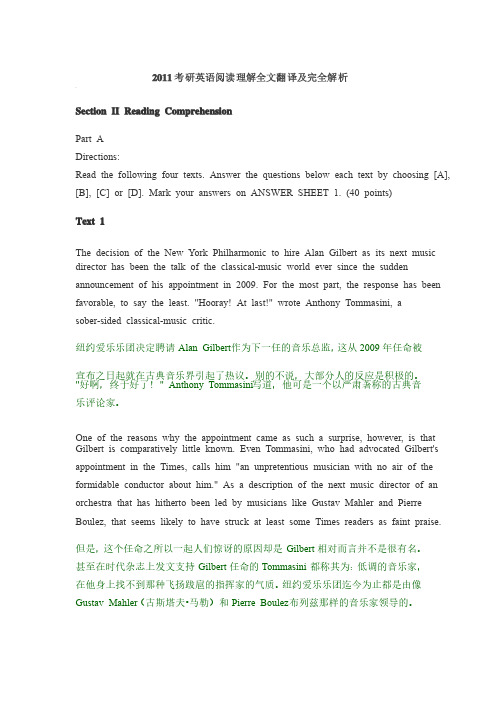
这样去描述这个乐团的下一位指挥,至少对于时代的读者而言,这是一种苍白的表扬。
For my part, I have no idea whether Gilbert is a great conductor or even a good one. To be sure, he performs an impressive variety of interesting compositions, but it is not necessary for me to visit Avery Fisher Hall, or anywhere else, to hear interesting orchestral music. All I have to do is to go to my CD shelf, or boot up my computer and download still more recorded music from iTunes. 就我看来,我不知道Gilbert是否是一个伟大的指挥家或者是一个好的指挥。
但是我能确定的是,他能表现出很多有趣的乐章,但是我却应该不会去Avery Fisher Hall或者其他地方去听一场有趣的交响乐演出。
我要做的事情就是去我的CD架上,或者打开的我的电脑从ITUNES上下载更多的唱片。
Devoted concertgoers who reply that recordings are no substitute for live performance are missing the point. For the time, attention, and money of the art-loving public, classical instrumentalists must compete not only with opera houses, dance troupes, theater companies, and museums, but also with the recorded performances of the great classical musicians of the 20th century. There recordings are cheap, available everywhere, and very often much higher in artistic quality than today's live performances; moreover, they can be "consumed" at a time and place of the listener's choosing. The widespread availability of such recordings has thus brought about a crisis in the institution of the traditional classical concert. 那些忠实的音乐会观众会讲唱片并不能代替现场的演出,但是他们忽略了一些事情。
2011年英语阅读真题
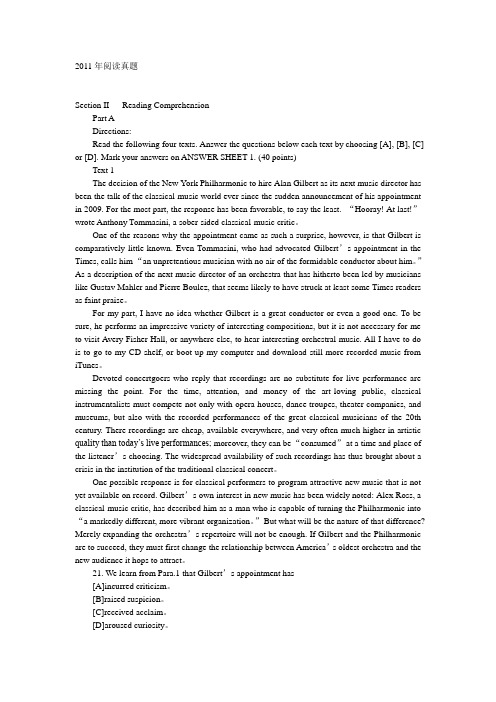
2011年阅读真题Section II Reading ComprehensionPart ADirections:Read the following four texts. Answer the questions below each text by choosing [A], [B], [C] or [D]. Mark your answers on ANSWER SHEET 1. (40 points)Text 1The decision of the New York Philharmonic to hire Alan Gilbert as its next music director has been the talk of the classical-music world ever since the sudden announcement of his appointment in 2009. For the most part, the response has been favorable, to say the least. “Hooray! At last!”wrote Anthony Tommasini, a sober-sided classical-music critic。
One of the reasons why the appointment came as such a surprise, however, is that Gilbert is comparatively little known. Even Tommasini, who had advocated Gilbert’s appointment in the Times, calls him “an unpretentious musician with no air of the formidable conductor about him。
2011年英语一阅读第一篇
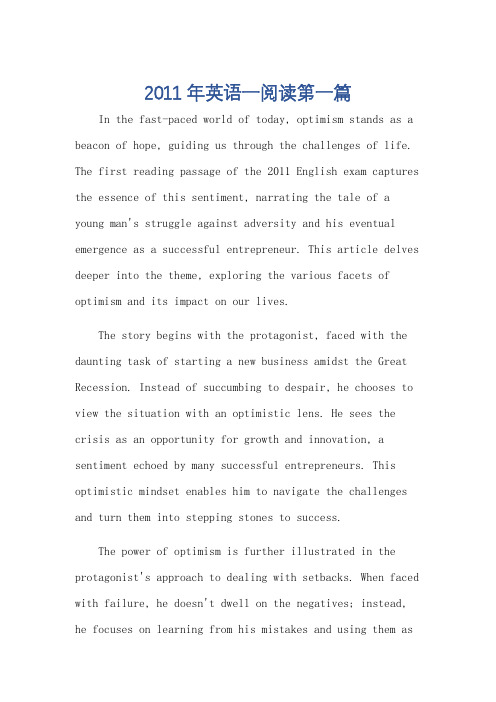
2011年英语一阅读第一篇In the fast-paced world of today, optimism stands as a beacon of hope, guiding us through the challenges of life. The first reading passage of the 2011 English exam captures the essence of this sentiment, narrating the tale of a young man's struggle against adversity and his eventual emergence as a successful entrepreneur. This article delves deeper into the theme, exploring the various facets of optimism and its impact on our lives.The story begins with the protagonist, faced with the daunting task of starting a new business amidst the Great Recession. Instead of succumbing to despair, he chooses to view the situation with an optimistic lens. He sees the crisis as an opportunity for growth and innovation, a sentiment echoed by many successful entrepreneurs. This optimistic mindset enables him to navigate the challenges and turn them into stepping stones to success.The power of optimism is further illustrated in the protagonist's approach to dealing with setbacks. When faced with failure, he doesn't dwell on the negatives; instead, he focuses on learning from his mistakes and using them asfuel for future success. This resilience and determination are hallmarks of an optimistic mindset, one that allows individuals to bounce back stronger after each fall.Moreover, optimism fosters a positive environment that attracts like-minded individuals and collaborators. The protagonist's belief in his vision and his positiveattitude attract a team of talented individuals who share his optimism. Together, they form a cohesive unit that is resilient and adaptable, capable of withstanding even the harshest of challenges.However, it's important to note that optimism is not blind denial of reality. It's a balanced approach that acknowledges the challenges while maintaining a belief in the potential for positive outcomes. This balanced optimism allows individuals to make informed decisions and take calculated risks, essential for achieving success.In conclusion, the power of optimism is a transformative force that can shape our lives in profound ways. It empowers us to view challenges as opportunities, learn from setbacks, and create a positive environment that attracts success. As the protagonist of the 2011 readingpassage demonstrates, with optimism, any obstacle can be overcome, and any dream can be achieved.**乐观的力量:穿越挑战的旅程**在当今快节奏的世界中,乐观如同一座希望的灯塔,引导我们走过生活的挑战。
2011年英语一阅读
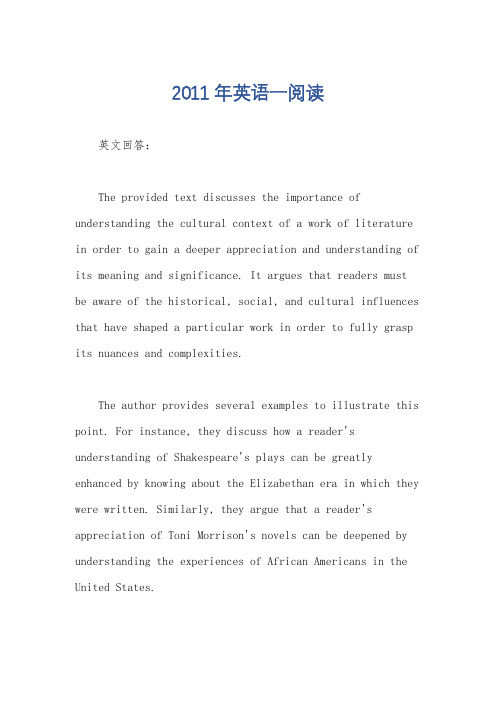
2011年英语一阅读英文回答:The provided text discusses the importance of understanding the cultural context of a work of literature in order to gain a deeper appreciation and understanding of its meaning and significance. It argues that readers must be aware of the historical, social, and cultural influences that have shaped a particular work in order to fully grasp its nuances and complexities.The author provides several examples to illustrate this point. For instance, they discuss how a reader's understanding of Shakespeare's plays can be greatly enhanced by knowing about the Elizabethan era in which they were written. Similarly, they argue that a reader's appreciation of Toni Morrison's novels can be deepened by understanding the experiences of African Americans in the United States.The author concludes by emphasizing that understanding the cultural context of a work of literature is essential for both academic and personal enrichment. It allows readers to engage more deeply with the text, to appreciate its subtleties, and to gain a richer understanding of the human experience.中文回答:本文探讨了理解文学作品的文化背景的重要性,以获得对作品意义和重要性的更深入的理解和欣赏。
2011年考研英语一阅读第三篇
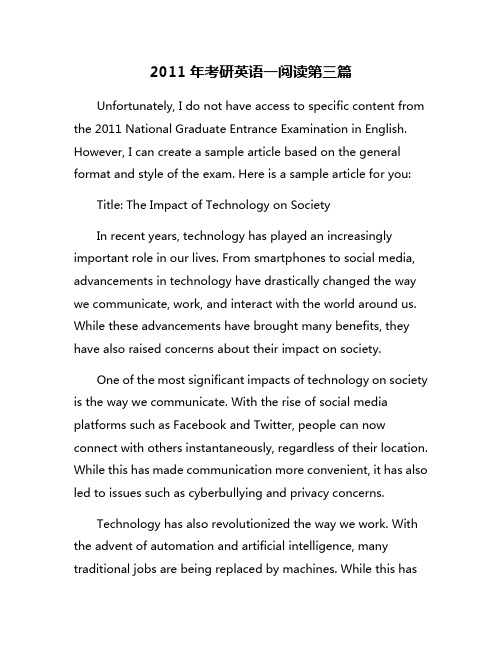
2011年考研英语一阅读第三篇Unfortunately, I do not have access to specific content from the 2011 National Graduate Entrance Examination in English. However, I can create a sample article based on the general format and style of the exam. Here is a sample article for you:Title: The Impact of Technology on SocietyIn recent years, technology has played an increasingly important role in our lives. From smartphones to social media, advancements in technology have drastically changed the way we communicate, work, and interact with the world around us. While these advancements have brought many benefits, they have also raised concerns about their impact on society.One of the most significant impacts of technology on society is the way we communicate. With the rise of social media platforms such as Facebook and Twitter, people can now connect with others instantaneously, regardless of their location. While this has made communication more convenient, it has also led to issues such as cyberbullying and privacy concerns.Technology has also revolutionized the way we work. With the advent of automation and artificial intelligence, many traditional jobs are being replaced by machines. While this hasled to increased efficiency and productivity, it has also raised concerns about unemployment and income inequality.Additionally, technology has had a profound impact on education. Online learning platforms and digital textbooks have made education more accessible to people around the world. However, this has also raised concerns about the quality of education and the role of teachers in the learning process.In conclusion, while technology has brought many benefits to society, it has also raised concerns about its impact on communication, work, and education. It is essential for policymakers, businesses, and individuals to consider these implications carefully and work towards harnessing the power of technology for the greater good of society.。
2011年英语一阅读第四篇
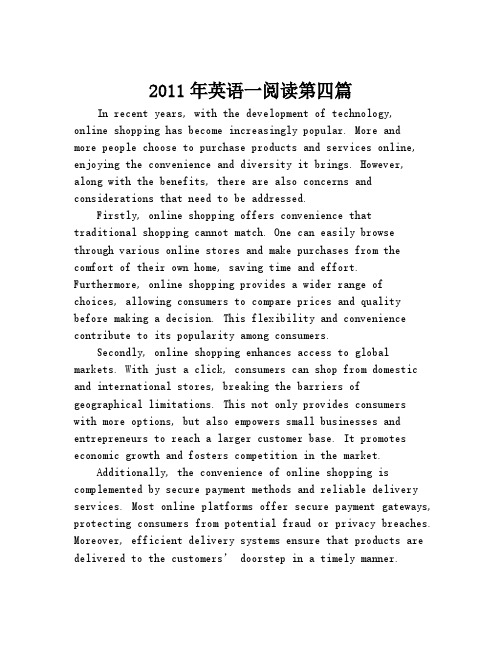
2011年英语一阅读第四篇In recent years, with the development of technology,online shopping has become increasingly popular. More andmore people choose to purchase products and services online, enjoying the convenience and diversity it brings. However, along with the benefits, there are also concerns and considerations that need to be addressed.Firstly, online shopping offers convenience thattraditional shopping cannot match. One can easily browse through various online stores and make purchases from the comfort of their own home, saving time and effort. Furthermore, online shopping provides a wider range of choices, allowing consumers to compare prices and quality before making a decision. This flexibility and convenience contribute to its popularity among consumers.Secondly, online shopping enhances access to global markets. With just a click, consumers can shop from domestic and international stores, breaking the barriers of geographical limitations. This not only provides consumerswith more options, but also empowers small businesses and entrepreneurs to reach a larger customer base. It promotes economic growth and fosters competition in the market.Additionally, the convenience of online shopping is complemented by secure payment methods and reliable delivery services. Most online platforms offer secure payment gateways, protecting consumers from potential fraud or privacy breaches. Moreover, efficient delivery systems ensure that products are delivered to the customers’ doorstep in a timely manner.These factors contribute to the overall satisfaction of online shoppers.Despite the advantages, there are some concerns and considerations associated with online shopping. One major concern is the trustworthiness of online sellers. It is crucial for consumers to verify the credibility and reputation of the seller before making a purchase. Furthermore, there may be potential risks of counterfeit products or improper handling of personal information. Therefore, consumers need to be cautious and vigilant when engaging in online transactions.In conclusion, online shopping has become a popular choice for consumers due to its convenience, accessibility, and variety of options. It offers a wide range of benefits, such as time-saving, global access, and secure transactions. However, consumers should also be aware of the potential risks and take necessary precautions when engaging in online shopping. By doing so, they can fully enjoy the advantages and ensure a satisfactory shopping experience.。
- 1、下载文档前请自行甄别文档内容的完整性,平台不提供额外的编辑、内容补充、找答案等附加服务。
- 2、"仅部分预览"的文档,不可在线预览部分如存在完整性等问题,可反馈申请退款(可完整预览的文档不适用该条件!)。
- 3、如文档侵犯您的权益,请联系客服反馈,我们会尽快为您处理(人工客服工作时间:9:00-18:30)。
AI got my first driver's license in 1953 by taking drivereducation in my first year at Central High School incharlotte, North Carolina. Four years later when itwas time to renew my license I was a married womanHenry and I were living in Baltimore, Maryland Twoweeks before my 20th birthday. Henry drove me tothe motor vehicle office on a hot July afternoon. When I got to the office and showed to theman behind the counter my North Catrolina driver's license ready to renew, the man told methat I was under age by Maryland law since I was not yet 21. "Mr. Henry Smith your husband.to sign for you," he said.I argued. pointing to a very large belly of mine, "I am married. I am having a baby. Why should Ihave to have someone sign for me to drive?" He answered coldly, "It's the law, madam?"Henry encouraged me to calm down, just go ahead and get the license and be done with it."No" I said. I refused to have him sign for me. So I left without a Maryland license.I called the North Carolina Motor Vehicle Office and renewed my NC license by mail — using myname Susan Brown. And thus it was for the next twelve years. Since Henry was in the army Icould drive under my home state license. By the time Henry left the army we were once againliving in Maryland and I had to take the Maryland driver's exam Since then I just go in and renewevery four years - sign the name Susan Brown have my new picture taken, and walk out with alicense to drive.56. Susan got her first driver's licenseA. before she got married to HenryB. when she was twenty years oldC. after she finished high schoolD. when she just moved to Maryland57. Susan failed to renew her license the first time in Maryland becauseA. she was forbidden to drive by Maryland lawB. she lacked driving experience in MarylandC. she was to give birth to a baby soonD. she insisted on signing for herself58. We can infer from the text that in the U. S.A. American males should serve in the armyB. different states my have different lawsC. people have to renew their licenses in their home statesD. women should adopt their husbands' family names after marriageBAbout 21,000 young people in 17 American states do not attend classes in school buildings.Instead, they receive their elementary and high school education byworking at home oncomputers. The center for Education Reform says the United States has 67 public"cyberschools" and that is about twice as many as two years ago.The money for students to attend a cybersehool comes from the governments of the stateswhere they live. Some educators say cyberschools receive money that should supporttraditional public schools. They also say it is difficult to know if students are learning well.Other educators praise this new form of education for letting students work at their own speed.These people say cyberschools help students who were unhappy or unsuccessful in traditionalschools. They say learning at home by computer ends long bus rides for children who live farfrom school.Whatever the judgment of cyberschools, they are getting more and more popular.For example,a new cyberschool called CommonwealthConnectionsAcademy will take in students this fall. It willserve children in the state of Pennsylvania from ages five through thirteen. Children get free equipment for their online education. This includes a computer, a printer,books and technical services. Parents and students talk with teachers by telephone or bysending emails through their computers when necessary.Students at cyberschools usually do not know one another. But 56 such students finishedstudies at WesternPennsylvaniaCyberCharterSchool recently met for the first time. They wereguests of honor at their graduation.59. What do we know from the text about students of a cyberschool?A. They have to take long bus rides to school.B. They study at home rather than in classrooms.C. They receive money from traditional public schools.D. They do well in traditional school programs.60. What is a problem with cyberschools?A. Their equipment costs a lot of money.B. They get little support from the state government.C. It is hard to know students' progress in learning.D. The students find it hard to make friends.61. Cyberschools are getting popular because _________.A. they are less expensive for studentsB. their students can work at their own speedC. their graduates are more successful in societyD. they serve students in a wider age range62. We can infer that the author of the text is ________.A. unprejudiced in his description of cyberschoolsB. excited about the future of cyberschoolsC. doubtful about the qualityof cyberschooisD. disappointed at the development of cyberschoolsCMany people believe Henry Ford invented theautomobile (汽车). But Henry Ford did not start tobuild his first car until 1896. That was eleven yearsafter two Germans developed the world's firstautomobile. Many people believe Henry Ford inventedthe production line that moved a car's parts to theworker, insteadof making the worker move to theparts. That is not true, either. Many factory ownersused methods of this kind before Ford. What HenryFord did was to use other people's ideas and makethem better. And he made the whole factory a moving production line.In the early days of the automobile, almost every ear maker raced his cars. It was the best wayof gaining public notice. Henry Ford decided to build a racing car. Ford's most famous race washis first one. It was also the last race in which he drove the car himself.The race was in 1901, at a field near Detroit. All of the most famous cars had entered, but onlytwo were left: the Winton and Ford's. The Winton was famous for its speed. Most peoplethought the race was over before it began.The Winton took an early lead. But halfway through the race, it began to lose power. Fordstarted to gain. And near the end of the race, he took the lead. Ford won the race and defeatedthe Winton. His name appeared in newspapers and he became well-known all over the UnitedStates. Within weeks of the race, Henry Ford formed a new automobile company. In 1903, adoctor in Detroit bought the first car from the company. That sale was the beginning of HenryFord's dream. Ford said: "I will build a motor car for the great mass of people. It will be largeenough for the family, but small enough for one person to operate and care for. It will be builtof the best materials. It will be built by the best men to be employed. And it will be built with thesimplest plans that modem engineering can produce. It will be so low in price that no manmaking good money will be unable to own one."The Model T was a car of that kind. It only cost $850. It was a simple machine that drivers coulddepend on. Doctors bought the Model T. So did farmers. Even criminals,They considered it thefastest and surest form of transportation. Americans loved the Model T. They wrote stories andsongs about it. Thousands of Model T's were built in the first few years.63. What do we know about Henry Ford from Paragraph 1?A. He made good use of ideas from others.B. He produced the first car in the world.C. He knew how to improve auto parts.D. He invented the production line.64. Why did Henry Ford take part in the 1901 car race?A. To show off his driving skills.B. To draw public attention.C. To learn about new technology.D. To raise money for his new company.65. "That sale" in Paragraph 4 refers to_________.A. the selling of Ford cars at reduced pricesB. the sale of Model T to the mass of peopleC. the selling of a car to a Detroit doctorD. the sales target for the Ford Company66. What was Henry Ford's dream according to the text?A. Producing cars for average customers.B. Building racing cars of simple design.C. Designing more car models.D. Starting more companies.DThe Coalition for the Homeless is an organization that seeks to address the needs of thehomeless population in the United States. It is a network of offices, some of which provide foodand houses for the homeless population, and some of which fight for the passing of laws thatwould give every American the right to a place to call home. according to the Coalition's studies,of over two hundred million people living in the United States, up to three million arehomeless—and the number is still growing since the late 1970s, fast rising house prices, largecuts in government supported housing programs, and economic recession(经济衰退) have madeit impossible for many Americans to meet housing costs. Sadly, this has resulted in a number ofpersons being forced to leave their homes and or unable to find new affordable homes.according to another research, families with children appear to be the fastest-growing part ofthe homeless population, making up 39% of it. The old idea of a homeless person, that of thesingle man who gets drunk all the time, is no longer true. A much larger part of the populationnow finds itself homeless. Even worse, once a person becomes homeless, he often finds itimpossible to find a job, since most employers require anyone who wants a job from them toprovide a home address on a job application67. The word "address" in the first line probably means_________.A. talk aboutB. deal withC. fight forD. write to68. How many people are homeless in the U. S. according to the Coalition studies?A. 39% of the population.B. 200 million people.C. About 3 million people.D. About one-fifth of the population.69. Homelesspeople often have difficulty finding a job because_________.A. they have no home addressesB. they mostly have a drinking problemC. they aren't supported by government programsD. they often don't have enough work experience70. What is the main cause of the rising number of the homeless in the U. S. ?A. The passing of new housing laws.B. The fast growth of family size.C. The slow construction of houses.D. The ever-rising price of housing.。
